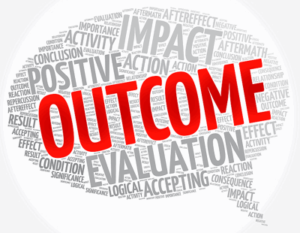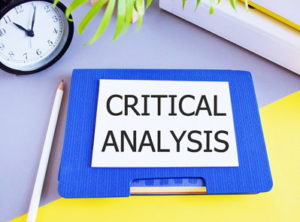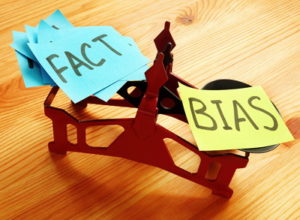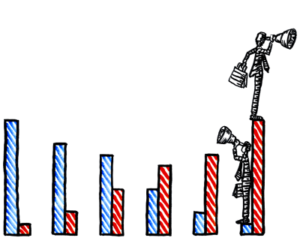 When we engage in any form of betting it is common to allow the outcome to dictate where do we think our strategy was the correct one. The perfect example of this can be found on the blackjack table, where the Basic Strategy is the statistically most likely way of playing that will see you win more often. On occasions when we follow Basic Strategy and succeed it was brilliant, but when we fail it’s a stupid way to play.
When we engage in any form of betting it is common to allow the outcome to dictate where do we think our strategy was the correct one. The perfect example of this can be found on the blackjack table, where the Basic Strategy is the statistically most likely way of playing that will see you win more often. On occasions when we follow Basic Strategy and succeed it was brilliant, but when we fail it’s a stupid way to play.
Imagine being sat at the blackjack table and being dealt 16. The dealer has an eight showing, so basic strategy says to hit. If you do so and get a five then it’s an amazing decision. If you get a six or higher, then it was an awful decision. Yet in both cases the decision-making process was the correct one and the outcome shouldn’t be allowed to change our opinion on that simple fact.
Outcome Bias Explained

Outcome bias is a phrase that refers to the tendency to judge and entire event based purely on its outcome. As with any other cognitive bias, it is the brain taking a shortcut in order to help us process events. In the world of sport, and football in particular, one of the best ways of thinking about this is a penalty. A player can take a brilliant penalty only to see the goalkeeper make an excellent save. The save doesn’t mean the penalty was poor.
Equally, a player can take a really poor penalty that ends up in the back of the net. The fact that it resulted in a goal doesn’t therefore mean that it was a well taken penalty. Yet it is common for commentators and football fans to view penalties in such binary terms. In a similar sense, a football team that lost the match didn’t necessarily play badly and so we need to avoid falling into the trap of allowing the outcome to dictate how we view something.
Where It Comes From
 Jonathan Baron and John Hershey were psychologists at the University of Pennsylvania back in 1988. They discovered evidence that people tend to look too heavily at the outcome of a decision when deciding whether the decision was a good one or not. They worked with a series of subjects and asked those people to assess how good one of the decisions was. Across five separate studies they asked people about gambling and medical choices.
Jonathan Baron and John Hershey were psychologists at the University of Pennsylvania back in 1988. They discovered evidence that people tend to look too heavily at the outcome of a decision when deciding whether the decision was a good one or not. They worked with a series of subjects and asked those people to assess how good one of the decisions was. Across five separate studies they asked people about gambling and medical choices.
The subject in question were given access to information they needed in order to make a decision. The subjects said they shouldn’t consider the outcome of the decision when assessing whether it was good or not, but they did. Even when they were asked to make a decision that was based purely on chance, such as pulling a card from the deck, with red cards receiving a reward and black cards not, they rated their decisions more highly when they correctly predicted the outcome.
Outcome Bias & Gambling
 In betting we can often fall into the trap of allowing outcome bias to retrospectively change the reasons we placed a bet. Before a horse race, for example, we can do heaps of research into which horses are best placed to be successful in the race in question. We can look up form, the going, which jockey is riding the horse and who is responsible for training the horse for the race, only for the horse to then lose.
In betting we can often fall into the trap of allowing outcome bias to retrospectively change the reasons we placed a bet. Before a horse race, for example, we can do heaps of research into which horses are best placed to be successful in the race in question. We can look up form, the going, which jockey is riding the horse and who is responsible for training the horse for the race, only for the horse to then lose.
The fact that the horse wasn’t successful doesn’t change the fact that our research was good. The “what” shouldn’t be allowed to alter our thinking about the “why”. As the person placing the bets, you have no control over any number of things involved in a horse race. It is therefore entirely unreasonable to judge your performance in placing bets by the outcome of the things that you’re betting on.
The same thing can be said for the outcome of a football match, a boxing bout or even something like a volleyball match. The success or otherwise of a bet is never dictated by the outcome, yet the very nature of outcome bias is such that we think the end result is the only thing that matters. This obviously isn’t true and the reality is that the process is just as important, if not more important, than the final result.
What It Means
 As Bettors, the work of Baron and Hershey is proof that we have to be very careful when assessing our own decisions. One of the best ways of doing this is to keep track of all of the bets that you place and their outcomes. Individual wins might well make you feel good but the reality is that you need to make sure that you’re not deceiving yourself. Keeping a profit and loss account ensures that this is the case.
As Bettors, the work of Baron and Hershey is proof that we have to be very careful when assessing our own decisions. One of the best ways of doing this is to keep track of all of the bets that you place and their outcomes. Individual wins might well make you feel good but the reality is that you need to make sure that you’re not deceiving yourself. Keeping a profit and loss account ensures that this is the case.
The other thing that Baron and Hershey’s work proves is that we should never put too much stock into what experts say. When the 2008 global financial crash hit, there were countless so-called experts who were called upon by the media for claiming that they predicted it. They sold millions of books as a result, yet in truth many had been predicting something similar for years beforehand but were only right once.
Human instinct means that we will always be less critical of a bad decision that results in a good outcome. That is, in essence, the definition of outcome bias. We need to be able to critically examine the process that led to our decision in the first place. If the process was good, then that’s the thing to remember regardless of the eventual outcome. If the process was bad, then we need to assess that even if it resulted in a positive outcome.
Examples Of Outcome Bias In Sports Betting
 Imagine a scenario in which Liverpool are playing Everton in the Premier League. Ahead of kick-off, Liverpool are the overwhelming favourites to win. In the warmup however, Liverpool goalkeeper gets injured. You decide to place a bet on Everton because Liverpool’s goalkeeper has been given the man of the match award in the last five matches, so his absence could be key to the result of the match.
Imagine a scenario in which Liverpool are playing Everton in the Premier League. Ahead of kick-off, Liverpool are the overwhelming favourites to win. In the warmup however, Liverpool goalkeeper gets injured. You decide to place a bet on Everton because Liverpool’s goalkeeper has been given the man of the match award in the last five matches, so his absence could be key to the result of the match.
In the end, Liverpool run out 3-0 winners, with the reserve goalkeeper making countless excellent saves. The reality is that you made the correct decision on your bet with the information you had available, so the outcome of the match shouldn’t change that fact. The next time you come to place a bet you should follow exactly the same logic that you did for Liverpool’s match against Everton because the outcome is irrelevant to your decision-making.
Avoiding Outcome Bias
 As with countless other heuristics, it’s important that we try to avoid falling into the traps that are offered by outcome bias. In the world of betting, wagers are binary. Your bet will either be a winner or a loser, and all you can do before making them is take into account as much information as possible. If you do this and your bet ends up being a loser then at least you’ll know that you were right to place it in the first place.
As with countless other heuristics, it’s important that we try to avoid falling into the traps that are offered by outcome bias. In the world of betting, wagers are binary. Your bet will either be a winner or a loser, and all you can do before making them is take into account as much information as possible. If you do this and your bet ends up being a loser then at least you’ll know that you were right to place it in the first place.
Whilst outcome bias and hindsight bias are related, they aren’t the same thing. Hindsight bias is when our memories of what happened in the past I distorted and we think that we knew that would happen all along. Outcome bias on the other hand involves putting more weight on the outcome of a decision than the information we had when making it. It’s entirely natural to fall guilty of outcome bias, but we must try hard not to.
The best thing that you can do is to ask yourself a series of questions in the wake of every bet you place. What led you to make the best in the first place? What was the information that you had available to you at the time that you placed the bet, and what information didn’t you have and only found out about afterwards? Was more data available at the time that you placed your bet that you didn’t know about, or are you happy that you placed your bet with the best knowledge to hand?
If you placed the bet with all information to hand and believed that you were placing the bright bet at the time then it’s entirely fair to think of that that positively even if the outcome went against you. Equally, if there had been more information available but you didn’t know about it, then you should acknowledge that you could have worked harder to make the better successful one and take that into account the next time you go to place a wager.
Another way to ensure that you’re not falling foul of outcome bias is to keep a note not only of the bets that you placed and the odds that you placed them at, but also of the odds when the match, horse race or other such event got underway. Obviously this is easiest in the world of horse racing, because you can compare the odds that you took with the starting price of the horse that you placed a bet on.
If the odds that you took were better than the starting price odds then it’s entirely fair to surmise that the bet was a good one. If the starting price odds went longer, then it’s likely that you didn’t consider all of the information that was available before placing your bet. As always, it’s important to do as much research as you can and to evaluate every decision made in as dispassionate a way as possible.
